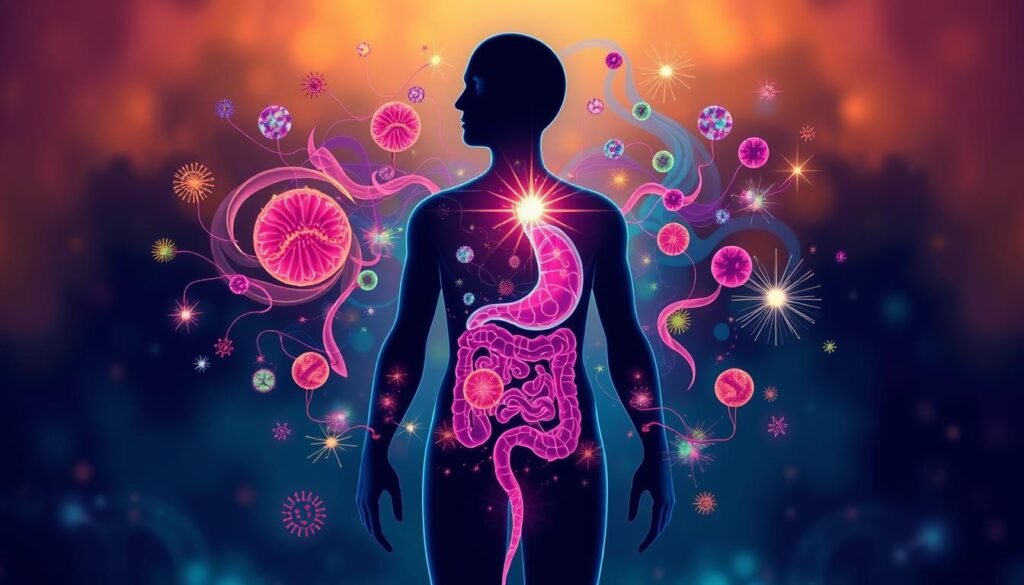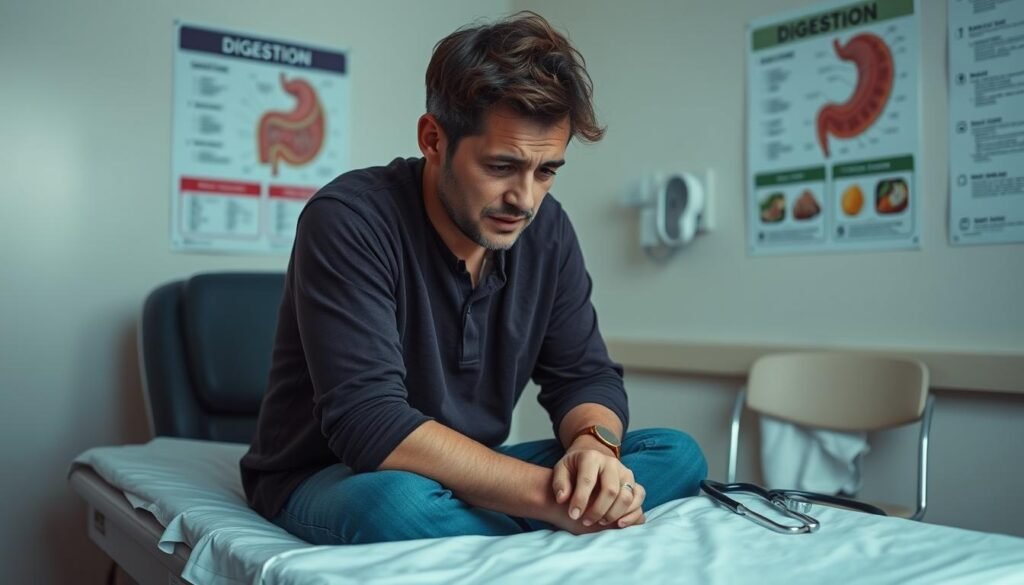A 2022 study shows that older adults in assisted living who had constipation felt more tired than those who didn’t. This leads us to question: Does constipation make you tired? Exploring the link between constipation and fatigue can help us understand how issues with our bowels affect our energy. This article will dig into whether constipation is just a symptom or if it actually causes fatigue. By looking at respected studies and information, you’ll learn more about how these health issues are connected.
Key Takeaways
- Constipation is defined as fewer than three bowel movements per week.
- Fatigue can have multiple causes, making it challenging to pinpoint the exact source.
- Better hydration and a high-fiber diet can help mitigate the risk of constipation.
- Certain medications, like opioids, are known contributors to both constipation and fatigue.
- Early medical consultation is essential if constipation is accompanied by alarming symptoms.
Understanding Constipation and Fatigue
Constipation means having less than three bowel movements a week. It’s a warning sign of possible health problems. When people strain during bowel movements or feel they haven’t fully evacuated, they might overlook the impact on their health. Constipation can lower energy by reducing nutrient absorption. This makes people feel tired.
Fatigue can come from many sources, like stress, not getting the right nutrients, and health issues. Conditions like depression and anxiety can make constipation and tiredness worse. Research shows a strong link between chronic constipation and feeling worn out. It highlights how these symptoms can affect each other.
As many as 25% of people deal with constipation, more so women. It’s a big concern when it causes complications like fecal impaction or hemorrhoids. Eating right and staying active are crucial for managing constipation and avoiding tiredness. For those looking for more ways to fight fatigue, check out natural remedies for adrenal fatigue, which also help digestive problems.
| Condition | Description | Impact on Health |
|---|---|---|
| Constipation | Less than three bowel movements a week | Can lead to fatigue and nutrient absorption issues |
| Fatigue | Persistent tiredness or lack of energy | May be caused by stress, anemia, or chronic pain |
| The Link | Correlates between constipation and fatigue | Highlights the need for comprehensive health evaluation |
Symptoms of Constipation
Constipation comes with signs that really impact your life. You might notice hard stools and the effort it takes to pass them. Feeling discomfort in your belly, like cramps and bloating, adds to the fatigue of chronic constipation. It’s key to watch out for changes, such as having less than three bowel movements a week.
Feeling unusually tired can also be a part of it, affecting your overall energy. It’s important to spot other issues, for example:
- Persistent abdominal discomfort or pain
- Gas buildup
- Blood in the stool
- Muscle weakness
- Cramping or diarrhea
Constipation is pretty common, with 16% to 33% of adults facing it sometime. Those over 60 have to be extra careful, especially in nursing homes. Not eating enough fiber or not drinking enough water can make stools harder. Also, too much stress, skipping out on exercise, or too many laxatives can make things worse.
Spotting these symptoms early can help you find help quickly. This is crucial for better health and happiness.
Symptoms of Fatigue
Fatigue is more than just feeling tired. It can affect your everyday life and happiness. If you’re always tired and rest doesn’t help, there might be a bigger problem. People may feel unmotivated and find even easy tasks hard. They might also have trouble sleeping, which keeps them from getting better rest.
It’s important to know these symptoms. If you have IBS, fatigue could make you feel worse. Studies show that about half of the people with IBS feel very tired. This shows how common fatigue is among them.
Stress is a big factor in feeling tired, especially with IBS. Nearly 75% of people with IBS say they are often stressed. This stress can affect both your mind and body. It’s key to see how ongoing tiredness impacts your life at work and home.
If you’re dealing with these symptoms, looking at your digestive health might help. The link between how well your bowels work and your energy levels is strong. For more tips, click here to see how to understand your symptoms better.
Common Causes of Constipation and Fatigue
Lots of things can cause dehydration, fatigue, and constipation. Not eating enough fiber is a big one. Fruits, vegetables, and whole grains are key for avoiding constipation.
Being dehydrated is another main cause. If you don’t drink enough water, it can make stools hard and dry. This makes it tough to move them through your intestines, causing discomfort and tiredness.

Changes in how you live, like more stress or travel, can mess with your digestion. Getting regular exercise helps keep your digestive system moving smoothly.
Having issues like Irritable Bowel Syndrome (IBS) also ups the risk of feeling fatigue and constipation. It can lead to irregular bowel movements. Ignoring the need to go can make constipation worse over time.
- Too much use of laxatives might make your body depend on them, making things more difficult.
- A slow metabolism due to hypothyroidism can cause constipation and make you feel more tired.
- Some drugs, such as opioids, can make constipation worse and increase fatigue.
- About 40% of pregnant women deal with constipation too.
Dealing with these issues means looking at your diet and how you live. Eating enough fiber and drinking lots of water is crucial. This helps tackle constipation and fatigue.
Does Constipation Cause Fatigue? Exploring the Link
Constipation and fatigue have a complex relationship. Various studies have been done on this topic. They show that people with chronic constipation often feel very tired. Research from 2022 found that older adults who reported constipation also had higher levels of fatigue. This suggests there might be a link between the two. However, proving a direct cause is still difficult.
Research Findings on Constipation and Fatigue
Many studies have found a strong link between constipation and fatigue. Fatigue has many causes, and constipation is a significant one, especially in older people. There’s growing proof that our digestive health affects our energy levels and how well we do daily tasks.
Underlying Conditions Contributing to Both Symptoms
Some health issues can lead to both constipation and fatigue. Irritable bowel syndrome (IBS) and chronic fatigue syndrome (CFS) are two examples where people may experience both problems. These conditions can cause a cycle of discomfort and tiredness. This makes it clear how important it is to treat each symptom with care.
Understanding the link between these symptoms can improve how we handle them. This might include changes to our diet or how we live our lives. For more tips on managing these issues, check out exploring the effects of constipation.
| Condition | Symptoms | Management Strategies |
|---|---|---|
| Constipation | Less than three bowel movements per week, hard stools, straining | Increase fiber intake, stay hydrated, regular physical activity |
| Fatigue | Persistent tiredness, difficulty concentrating, lack of energy | Maintain a balanced diet, ensure adequate sleep, manage stress |
| IBS | Abdominal pain, bloating, altered bowel habits | Dietary changes, stress management, potential medications |
| CFS | Extreme fatigue, sleep disturbances, muscle pain | Graded exercise therapy, cognitive behavioral therapy, lifestyle changes |
Medication-Induced Constipation and Fatigue
Medications can play a big role in causing both constipation and fatigue. This can interfere with daily life and overall well-being. Opioids, often used for pain, cause constipation in 41-81% of people with chronic pain not from cancer, studies reveal. The impact on the gut can lead to discomfort and less energy.
Cancer treatments, like some chemotherapy drugs, also lead to constipation and tiredness. A study found that 39% of cancer survivors and 55% in treatment feel these effects. For those with advanced cancer, this increases to 66%. These medications can cause stomach issues, making fatigue worse.
Long-term opioid use comes with other risks, including sleepiness and breathing problems, making tiredness worse. Health experts, like the CDC, are concerned about opioid overuse and side effects. A study showed that a plan to prevent constipation helped reduce the symptoms by 55.1%. This underscores the need to watch how medications affect you closely.
Talking openly with healthcare providers about side effects is key to managing these issues. It’s important for patients to talk about alternatives if their medication causes severe constipation and fatigue.
For more details on fatigue-related conditions, the diagnosis and medical coding of fatigue might be useful.
The Role of Dehydration and Malnutrition
Dehydration and malnutrition are closely linked to various health issues such as fatigue and constipation. When the body is chronically dehydrated, it struggles to function well. This can make digestion hard, leading to less frequent bowel movements.
Feeling constantly tired or lethargic is common with dehydration. Such feelings make fatigue worse.
Making poor food choices can lead to not getting enough nutrients. This is called malnutrition. Not getting enough dietary fiber makes constipation more likely. Fiber is key for keeping bowel movements regular.
Also, not absorbing enough nutrients can make you feel tired all the time. To fix these problems, we need good ways to improve how much water and nutrients we get.
Consider the following methods to alleviate symptoms associated with dehydration and malnutrition:
- Drink plenty of water throughout the day to maintain hydration levels.
- Incorporate fiber-rich foods, such as fruits, vegetables, and whole grains, into the diet.
- Use assistive tableware for easier mealtimes, especially beneficial for those with feeding difficulties.
- Modify mealtime environments to create a more relaxed setting, encouraging proper eating habits.
For more information on addressing malnutrition and dehydration, check this relevant resource. Focusing on staying hydrated and eating a balanced diet helps manage the effects of dehydration and malnutrition on health.
| Strategies | Benefits |
|---|---|
| Increase water intake | Prevents dehydration |
| Enhance fiber intake | Improves digestion |
| Assistive tableware | Facilitates easier eating |
| Relaxed mealtime environments | Encourages proper nutrition. |
Impact of Gut Health on Energy Levels
There’s a strong link between gut health and how energetic you feel. A healthy gut microbiome is key for digestive health energy and staying vibrant. If your gut health suffers, you might face issues like constipation and tiredness, making everyday tasks hard.
Problems such as thyroid issues, rheumatoid arthritis, and type 1 diabetes can point to gut problems. These issues show how vital gut health is to feeling energetic. And if you often have diarrhea, bloating, or heartburn, your gut may need help.
Poor gut health doesn’t just affect your stomach; it can lead to depression and anxiety too. Feeling constantly tired or sluggish is another sign to watch for. It’s interesting to note that 54% of people with irritable bowel syndrome (IBS) also feel very tired.
To boost your gut health, changing what you eat can help a lot. Eating probiotic-rich foods like yogurt and kimchi can make a big difference. Prebiotics from veggies and whole grains are also fantastic for your gut.
Drinking enough water is crucial too. Staying hydrated helps your digestion and can fight symptoms like lack of focus and muscle weakness that come from being dehydrated.

Choosing fresh veggies and lean meats at the store is good for your gut. Including whole grains and low-fat dairy in your meals helps too. A balanced diet is great for your gut bacteria, which affects your energy and health.
Moderate exercise can also improve your gut bacteria, research shows. By staying active, you can have a healthier gut. For more on how gut health and energy are linked, check this study.
| Indicator | Impact on Gut Health | Connection to Energy Levels |
|---|---|---|
| Autoimmune Disorders | Signals poor gut microbiome | Can lead to fatigue |
| Digestive Symptoms | Reflect imbalance in gut bacteria | May reduce energy levels |
| Probiotic Sources | Support gut health improvement | Enhance digestive health energy |
| Hydration | Improves digestive efficiency | Reduces fatigue symptoms |
| Moderate Exercise | Increases beneficial gut bacteria | Boosts overall energy levels |
Preventive Measures for Constipation and Fatigue
Being proactive about your health can greatly prevent constipation and reduce fatigue. Simple changes in your lifestyle and diet can boost your well-being.
Staying hydrated is key for smooth bowel movements. Aim to drink 8 to 10 glasses of water every day. This will soften your stool and make it easier to pass.
Fiber is essential in fighting constipation. Add more fruits, vegetables, and whole grains to your meals to keep your digestive system running smoothly. However, increasing fiber intake could be hard for some, as 29% find it challenging. But, minor changes in your diet can improve your digestive health.
Exercise regularly to help your digestion and boost your energy. Even a quick walk daily can help keep your bowels moving and reduce fatigue. An active life improves your blood flow and overall energy.
Good bathroom habits help in preventing constipation. Establishing a regular routine trains your body, making it easier to have bowel movements. Using foot stools in the bathroom can put your body in a better position, helping with bowel movements.
Improving hydration, eating fiber-rich foods, staying active, and maintaining healthy bathroom routines make a big difference. These steps not only prevent constipation and fatigue but also lead to a healthier life.
When to Seek Medical Attention
Constipation can point to more serious problems. It’s key to know when to get help. If symptoms last for weeks or get worse, it can lead to fecal impaction. This means a lot of dry, hard stool is stuck in the rectum. Overflow diarrhea can warn you of this issue.
Many things cause fecal impaction like pain medicine side effects, not enough fiber, little exercise, and stress or anxiety. It’s important to watch out for symptoms such as:
- Severe abdominal pain
- Rectal bleeding
- Nausea and vomiting
- Fatigue and weakness
- Dizziness and fainting
- Swollen abdomen
- High or low blood pressure
- Fast heart rate
Getting help early can stop constipation problems. If you suddenly change bowel habits, see a doctor. This is vital if you have a lot of pain, blood in your stool, unplanned weight loss, or if you’re throwing up. These signs, along with feeling very tired, may mean you need urgent care.
In places like Houston, knowing when constipation is an emergency is key. Doctors can create a personal plan for you. This can include changes in lifestyle, diet, and the right medicines to manage constipation.

Staying informed about bowel health shows how constipation links to fatigue. Talking to doctors can prevent further issues and improve your life.
| Symptoms of Severe Constipation Complications | Suggested Actions |
|---|---|
| Abdominal pain | Consult a doctor immediately |
| Rectal bleeding | Seek emergency medical evaluation |
| Fatigue or weakness | Schedule an appointment with a healthcare provider |
| Dizziness | Assess hydration and seek help |
| Nausea and vomiting | Contact a medical professional for advice |
Conclusion
Research reveals a complex link between constipation and fatigue. They often occur together but don’t directly cause each other. Understanding this connection is key to managing both symptoms effectively.
To deal with these issues, adopting a healthy lifestyle is essential. Eating fiber-rich foods, drinking plenty of water, and exercising regularly can help. Also, don’t delay in seeking medical help for constipation to prevent serious problems.
Educating ourselves about digestive health is vital, especially as constipation is common among older adults. Knowing how these symptoms relate makes managing our health easier. An integrated approach to wellness improves energy and life quality. This should encourage us to focus on better digestion and fatigue management.